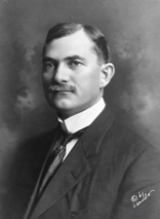
William F. Kirby
Encyclopedia
William Fosgate Kirby was a Democratic Party politician from Arkansas
who represented the state in the U.S. Senate from 1916 to 1921.
Kirby was born in Miller County, Arkansas near Texarkana
on November 16, 1867, and attended common schools. He studied law at Cumberland School of Law
at Cumberland University
, graduating in 1885, in which year he was admitted to the bar and began practice in Texarkana. A member of the state House of Representatives in 1893 and again in 1897, Kirby served in the state senate from 1899 to 1901. In 1904 he wrote Kirby’s Digest of the Statutes of Arkansas; in 1907 he moved to Little Rock
. He was the state's attorney general
from 1907 to 1909, and was elected associate justice of the state supreme court
, serving from 1910 to 1916.
He resigned upon his election to the Senate to serve out the term of James P. Clarke, who had died in office. As a senator, Kirby chaired the Committee on Expenditures in the Department of Agriculture, and serevd on the Committee on Patents. An unsuccessful candidate for renomination in 1920 and again in 1932, he resumed his law practice upon leaving the Senate. He again became an associate justice of the state supreme court, serving from 1926 until his death; he died in Little Rock on July 26, 1934, and is buried in Texarkana.
Arkansas
Arkansas is a state located in the southern region of the United States. Its name is an Algonquian name of the Quapaw Indians. Arkansas shares borders with six states , and its eastern border is largely defined by the Mississippi River...
who represented the state in the U.S. Senate from 1916 to 1921.
Kirby was born in Miller County, Arkansas near Texarkana
Texarkana, Arkansas
As of the census of 2000, there were 26,448 people, 10,384 households, and 7,040 families residing in the city. The population density was 830.5 people per square mile . There were 11,721 housing units at an average density of 368.1 per square mile...
on November 16, 1867, and attended common schools. He studied law at Cumberland School of Law
Cumberland School of Law
Cumberland School of Law is an ABA accredited law school at Samford University in Birmingham, Alabama. The 11th oldest law school in the United States, it is 160 years old and has more than 11,000 graduates. Its alumni include two United States Supreme Court Justices; Nobel Peace Prize recipient...
at Cumberland University
Cumberland University
Cumberland University is a private university in Lebanon, Tennessee, United States. It was founded in 1842, though the current campus buildings were constructed between 1892 and 1896.-History:...
, graduating in 1885, in which year he was admitted to the bar and began practice in Texarkana. A member of the state House of Representatives in 1893 and again in 1897, Kirby served in the state senate from 1899 to 1901. In 1904 he wrote Kirby’s Digest of the Statutes of Arkansas; in 1907 he moved to Little Rock
Little Rock, Arkansas
Little Rock is the capital and the largest city of the U.S. state of Arkansas. The Metropolitan Statistical Area had a population of 699,757 people in the 2010 census...
. He was the state's attorney general
Attorney General
In most common law jurisdictions, the attorney general, or attorney-general, is the main legal advisor to the government, and in some jurisdictions he or she may also have executive responsibility for law enforcement or responsibility for public prosecutions.The term is used to refer to any person...
from 1907 to 1909, and was elected associate justice of the state supreme court
Supreme court
A supreme court is the highest court within the hierarchy of many legal jurisdictions. Other descriptions for such courts include court of last resort, instance court, judgment court, high court, or apex court...
, serving from 1910 to 1916.
He resigned upon his election to the Senate to serve out the term of James P. Clarke, who had died in office. As a senator, Kirby chaired the Committee on Expenditures in the Department of Agriculture, and serevd on the Committee on Patents. An unsuccessful candidate for renomination in 1920 and again in 1932, he resumed his law practice upon leaving the Senate. He again became an associate justice of the state supreme court, serving from 1926 until his death; he died in Little Rock on July 26, 1934, and is buried in Texarkana.

